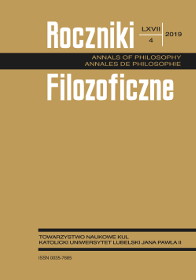How Save Aquinas’s “Intellectus essentiae Argument” for the Real Distinction between Essence and Esse?
How Save Aquinas’s “Intellectus essentiae Argument” for the Real Distinction between Essence and Esse?
Author(s): David TwettenSubject(s): Philosophy, History of Philosophy, Metaphysics, Philosophy of Middle Ages
Published by: Towarzystwo Naukowe KUL & Katolicki Uniwersytet Lubelski Jana Pawła II
Keywords: Aquinas; “Intellectus essentiae Argument”; esse; essence; Lawrence Dewan
Summary/Abstract: Aquinas’ so-called “Intellectus essentiae Argument” for the distinction between being and essence is notoriously suspect, including among defenders of Aquinas’ distinction. For the paper in this volume, I take as my starting point the recent defense of the argument by Fr. Lawrence Dewan, O.P. Fr. Dewan’s project is unsuccessful. Pointing out some shortcomings in his readings allows me to take up his call to highlight the “formal” or “quidditative side” of Aquinas’ metaphysics, in this case in regards to the proofs of the “real distinction.” Accordingly, the second half of this paper sets forth a way in which the famous “Intellectus essentiae Argument” of De Ente et Essentia 4 can succeed as a proof of the real distinction. Aquinas’ argument presupposes the prior real distinction between essence and supposit or individual substance. Esse is the ontological component that makes true our judgments that substances actually are: Obama exists. By contrast, this “truth-maker” cannot be predicated of humanity, although it is in Obama as really distinct from him. If Aquinas’ reasoning in this most contentious of his proofs can be saved, so, perhaps, can most of his other proofs.
Journal: Roczniki Filozoficzne
- Issue Year: 67/2019
- Issue No: 4
- Page Range: 129-143
- Page Count: 16
- Language: English

